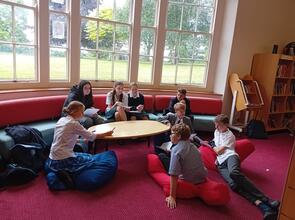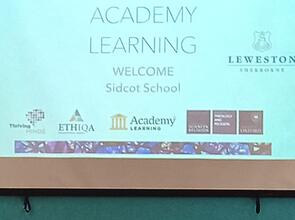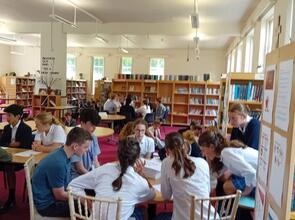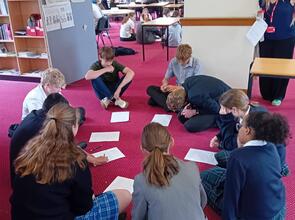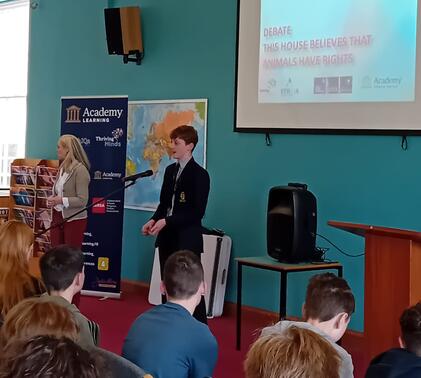
By Clare Winchester-Snell, Academic Enrichment Co-ordinator
On Tuesday, 24 June, 12 Academic Scholars in Years 7, 8, and 9 travelled to a conference at Leweston School in Dorset. The conference was organised by Academy Learning, who organise academic conferences around the world, and was hosted by its founder, Julie Arliss, an Oxford lecturer.
The day was centred around three lectures and a debate, and we were one of six schools taking part. The first was on the topic of Aristotle. Our lecturer discussed the beginnings of the Philosopher’s ideas around each individual having the potential to realise its' distinct nature, which he came up with after observing plants and animals. The examples of seagulls, spiders, lion cubs, and even the Black Knight from Monty Python and the Holy Grail all supported Aristotle’s theory that if things do not realise their potential, then they are defective. She developed this argument into character traits and how, as human beings, we have the function and potential to understand ourselves, others and the world and can therefore reflect, which makes us responsible for our choices. Julie related this idea to the current climate and explained that in this world of 'Fake News', we have to be ever more vigilant in questioning the information we have in order to make valued decisions. Aristotle's theory underlies many of the self-help books you see today, emphasising the concepts of positive psychology and authentic happiness. This was a very engaging and thought-provoking lecture that made us all question what kind of thinkers we will be, and what kind of influences we wish to become.
Our second session was a Community of Inquiry. This was a more collaborative task where students from each school were grouped together and presented with a stimulus by a Greek God about how they dealt with the dead bodies of their fathers, called 'Is Custom King?' This was a friendly and inclusive discussion that encouraged our students to come out of their comfort zones by striking up conversations with new people, whilst also encouraging the value of listening to others’ thoughts and ideas to build empathy. Once the groups had spent 30 minutes discussing the stimulus and working through a range of questions, they fed back their ideas in an open forum, which moved the debate topic into the conceptual world of values such as respect, and enabled students to develop their lateral thinking by connecting these ideas with the first talk. The discussion broached the topics of slavery, murder, disposing of dead bodies, culture, law, and tolerance, and finished with an introduction to Plato’s contradictory theory from Aristotle’s that in a world of invisible concepts, we are attracted to the good.
After lunch in the stunning grounds of Leweston School, our third lecture brought up the relevant and current topic of Nanotechnologies and their impacts, both to date and foreseen in the future, on Food, Electronics, Medicine and Power. It was fascinating to hear quite how small a nanometre is, yet the belief that it will revolutionise our lives in the same way as electricity and the internet have done. The lecturer raised concerns that many of these elements are unpredictable and we cannot foresee their exact implication, but concluded that the risk against the reward is wide open.
Our final session was a debate entitled 'This House Believes That Animals Have Rights'. Four of the Leweston students presented the very popular, well-researched argument in favour of the motion, whilst Julie delivered a very compelling though unpopular argument against animals having rights. The floor was then open to students from each school to come up to the lectern to share their ideas, and Tom Richard presented a very clear and convincing point about the anarchy that could be created by giving animals the same rights as humans.
This conference was about presenting knowledge on a bigger scale and allowing us to discover new ideas and thoughts and to discuss these in an informed way with like-minded students from other schools.



